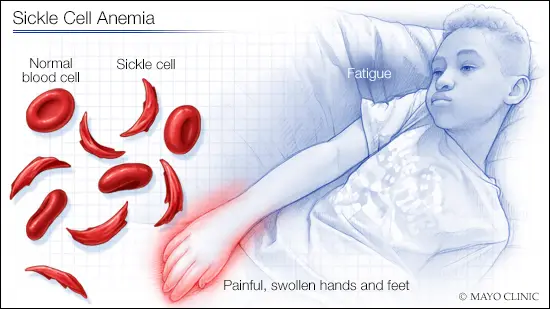Prime Business Africa presents all you need to know about the disease that families have found no answers to rather would have to manage to mitigate the situation.
Sickle Cell Disorder is prevalent in most countries of the world and is a sickness that affects all ages, social strata and race.
Join our WhatsApp ChannelNigeria is the epicenter zone in Africa and reports on the devastating effects of the disease shows that there is a paucity of knowledge on how hemoglobin variants, personal characteristics, and environment (socio-demographic triangle) interact to influence SCD propagation.
A clinical overview of these epidemiologic parameters may proffer strategies for controlling the SCD disease burden.
Sickle cell disease is a group of inherited red blood cell disorders that affect hemoglobin, the protein that carries oxygen through the body.
The condition affects more than 100,000 people in the United States and 20 million people worldwide.
Sickle anemia is a genetic condition characterized by abnormal red blood cells containing a defective form of hemoglobin.
The cells are shaped like a Sickle and these Sickles cells are fragile. They stick together and break.
Sickle blood cells clog small aeteries in the bones, spleen, liver, lungs, and other tissues.
The result is episodes of terrible pain, especially in the chest, abdomen and lungs. These painful eposides are unpredictable but may be triggered by infection and by hot or cold weather.
Sickle anemia has no cure, and treatment can only reduce the severity of the anemia.
Painful episodes are usually treated in the hospital with strong pain medicines, fluids, oxygen and antibiotics if the episode was brought in by an infection.
Sickle-cell anemia is inherited from both parents. Each parent must pass a Sickle cell gene to the child for the child to have Sickle cell anemia.
Sickle cell anemia occurs in people who inherit the gene from both parents.
Found chiefly in black populations and causes anemia, jaundice and recurring attacks of fever and pain in the arms, legs and abdomen.
Sickle cell trait
Inheriting the gene for Sickle cell anemia from only one parent. It causes no symptoms. But it means they have inherited one faulty hemoglobin to prevent most symptoms.
Izuchukwu Okosi is a Nigerian sports and entertainment journalist with two decades of experience in the media industry having begun his media journey in 2002 as an intern at Mundial Sports International (MSI) and Africa Independent Television (AIT), owners of Daar Communications Plc.


















Follow Us